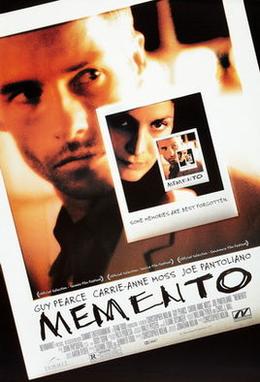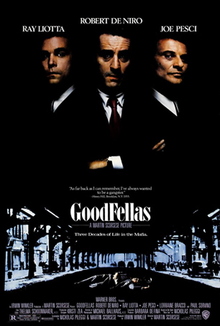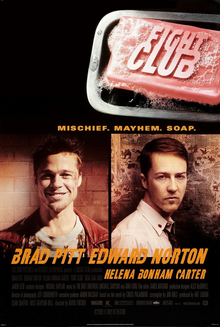



 (0 votes)
(0 votes) Ok guys we're getting down to the business end of things now! Here are the final 16 in order of seeding:
#1 – The Shawshank Redemption (1994)
#4 – Pulp Fiction (1994)
#9 – The Lord Of The Rings: Return Of The King (2003)
#10 – Star Wars Episode V: The Empire Strikes Back (1980)
#11 – Fight Club (1999)
#12 – One Flew Over The Cuckoo's Nest (1975)
#15 – Goodfellas (1990)
#16 – Star Wars Episode IV: A New Hope (1977)
#20 – Forrest Gump (1994)
#25 – The SIlence Of The Lambs (1991)
#26 – Se7en (1995)
#28 – The Usual Suspects (1995)
#34 – Memento (2000)
#35 – American History X (1998)
#46 – American Beauty (1999)
#WC1 – The Breakfast Club (1985)
I will do 2 rounds of 4 matches each. And unlike previously, in the event of a tie, i will keep voting open until we get an odd amount of votes.
Ok, let's begin with the first 4 matches:
Match 241 – #25 – The Silence Of The Lambs (1991) V #9 – The Lord Of The Rings: Return Of The King (2003)

TOURNAMENT HISTORY
Top 256 – Let The Right One In 6-1
Top 128 – Casino 4-1
Top 64 – V For Vendetta 5-1
Top 32 – Slumdog Millionaire 6-1
The Silence of the Lambs is a 1991 American thriller film that blends elements of the crime and horror genres. It was directed by Jonathan Demme and stars
Jodie Foster, Anthony Hopkins, Ted Levine, and Scott Glenn. It is based on the 1988 novel of the same name by Thomas Harris, his second to feature
Hannibal Lecter, a brilliant psychiatrist and cannibalistic serial killer.
In the film, Clarice Starling, a young FBI trainee, seeks the advice of the imprisoned Dr. Lecter to apprehend another serial killer, known only as “Buffalo Bill”.
The Silence of the Lambs was released on February 14, 1991, and grossed over $272 million. The film was the third film to win Oscars in all the top five
categories: Best Picture, Best Actress, Best Actor, Best Director and Best Adapted Screenplay. It is also the first winner of Best Picture widely considered to be
a horror film, and only the second such film to be nominated in the category, after The Exorcist in 1973. The film is considered “culturally, historically or
aesthetically” significant by the US Library of Congress and was selected to be preserved in the National Film Registry in 2011.

TOURNAMENT HISTORY
Top 256 – The Philadelphia Story 8-1
Top 128 – Gran Torino 3-2
Top 64 – A Beautiful Mind 4-2
Top 32 – Alien 3-3
The Lord of the Rings: The Return of the King is a 2003 epic fantasy-drama film directed by Peter Jackson based on the second and third volumes of J. R. R.
Tolkien's The Lord of the Rings. It is the concluding film in The Lord of the Rings film trilogy, following The Fellowship of the Ring (2001) and The Two Towers
(2002).
As Sauron launches the final stages of his conquest of Middle-earth, Gandalf the Wizard, and Théoden King of Rohan rally their forces to help defend Gondor's
capital Minas Tirith from the looming threat. Aragorn finally claims the throne of Gondor and summons an army of ghosts to help him defeat Sauron.
Ultimately, even with full strength of arms, they realise they cannot win; so it comes down to the Hobbits, Frodo and Sam, to bear the burden of the Ring and
deal with the treachery of Gollum. After a long journey they finally arrive in the dangerous lands of Mordor, seeking to destroy the One Ring in the place it was
created, the volcanic fires of Mount Doom.
Released on 17 December 2003, The Lord of the Rings: The Return of the King received rave reviews and became one of the greatest critical and box-office
successes of all time, being only the second film to gross $1 billion worldwide, becoming the highest grossing film from New Line Cinema, as well as the biggest
financial success for Time Warner in general, until Harry Potter and the Deathly Hallows – Part 2 surpassed The Return of the King's final gross in 2011.
Notably, it won all eleven Academy Awards for which it was nominated, an Oscar record, and tied for largest number of awards won with Ben-Hur and Titanic.
It also won the Academy Award for Best Picture, the first and only time a fantasy film has done so; it was also the second sequel to win a Best Picture Oscar
(following The Godfather Part II) and the only time a sequel has won without a predecessor winning the award. It was the highest-grossing film of 2003.
Match 242 – #4 – Pulp Fiction (1994) V #20 – Forrest Gump (1994)

TOURNAMENT HISTORY
Top 256 – Ocean's Eleven 6-0
Top 128 – Cool Hand Luke 6-1
Top 64 – A Clockwork Orange 6-0
Top 32 – Apocalypse Now 6-0
Pulp Fiction is a 1994 American crime film directed by Quentin Tarantino, who co-wrote its screenplay with Roger Avary. The film is known for its rich, eclectic
dialogue, ironic mix of humor and violence, nonlinear storyline, and host of cinematic allusions and pop culture references. The film was nominated for seven
Oscars, including Best Picture; Tarantino and Avary won for Best Original Screenplay. It was also awarded the Palme d'Or at the 1994 Cannes Film Festival. A
major critical and commercial success, it revitalized the career of its leading man, John Travolta, who received an Academy Award nomination, as did costars
Samuel L. Jackson and Uma Thurman.
Directed in a highly stylized manner, Pulp Fiction connects the intersecting storylines of Los Angeles mobsters, fringe players, small-time criminals, and a
mysterious briefcase. Considerable screen time is devoted to conversations and monologues that reveal the characters' senses of humor and perspectives on
life. The film's title refers to the pulp magazines and hardboiled crime novels popular during the mid-20th century, known for their graphic violence and punchy
dialogue. Pulp Fiction is self-referential from its opening moments, beginning with a title card that gives two dictionary definitions of “pulp”. The plot, as in many
of Tarantino's other works, is presented out of chronological sequence.
The picture's self-reflexivity, unconventional structure, and extensive use of homage and pastiche have led critics to describe it as a prime example of
postmodern film. Considered by some critics a black comedy, the film is also frequently labeled a “neo-noir”. Critic Geoffrey O'Brien argues otherwise: “The
old-time noir passions, the brooding melancholy and operatic death scenes, would be altogether out of place in the crisp and brightly lit wonderland that
Tarantino conjures up. [It is] neither neo-noir nor a parody of noir”. Similarly, Nicholas Christopher calls it “more gangland camp than neo-noir”, and Foster
Hirsch suggests that its “trippy fantasy landscape” characterizes it more definitively than any genre label. Pulp Fiction is viewed as the inspiration for many later
movies that adopted various elements of its style. The nature of its development, marketing, and distribution and its consequent profitability had a sweeping
effect on the field of independent cinema (although it is not an independent film itself). Considered a cultural watershed, Pulp Fiction's influence has been felt in
several other media, and it is widely regarded as one of the greatest films of all time.
http://www.imdb.com/title/tt0110912/
http://en.wikipedia.org/wiki/Pulp_Fiction

TOURNAMENT HISTORY
Top 256 – In The Heat Of The Night 6-0
Top 128 – Kill Bill: Vol. 1 4-2
Top 64 – The Shining 4-2
Top 32 – Snatch 3-3
Forrest Gump is a 1994 American romantic drama film based on the 1986 novel of the same name by Winston Groom. The film was directed by Robert
Zemeckis and starred Tom Hanks, Robin Wright, Gary Sinise and Sally Field. The story depicts several decades in the life of Forrest Gump, a naïve and
slow-witted yet athletically prodigious native of Alabama who witnesses, and in some cases influences, some of the defining events of the latter half of the 20th
century; more specifically, the period between Forrest's birth in 1945 and 1982.
The film differs substantially from Winston Groom's novel on which it is based, including Gump's personality and several events that were depicted. Filming
took place in late 1993, mainly in Georgia, North Carolina, and South Carolina. Extensive visual effects were used to incorporate the protagonist into archived
footage and to develop other scenes. A comprehensive soundtrack was featured in the film, using music intended to pinpoint specific time periods portrayed
on screen. Its commercial release made it a top-selling soundtrack, selling over 8 million copies worldwide.
Released in the United States on July 6, 1994, Forrest Gump was well received by critics and became a commercial success as the top grossing film in North
America released that year, being the first major success for Paramount Pictures since the studio's sale to Viacom earlier in the year. The film earned over $677 million worldwide during its theatrical run. The film won the Academy Awards for Best Picture, Best Director for Robert Zemeckis, Best Actor for Tom Hanks,
Best Adapted Screenplay, Best Visual Effects and Best Film Editing. It also garnered multiple other awards and nominations, including Golden Globe Awards,
People's Choice Awards and Young Artist Awards, among others. Since the film's release, varying interpretations have been made of the film's protagonist and
its political symbolism. In 1996, a themed restaurant opened based on the film, and has since expanded to multiple locations worldwide. The scene of Gump
running across the country is often referred to when real-life people attempt the feat. In 2011, the Library of Congress selected Forrest Gump for preservation
in the United States National Film Registry as being “culturally, historically, or aesthetically significant.”
Match 143 – #34 – Memento (2000) V #15 – Goodfellas (1990)

TOURNAMENT HISTORY
Top 256 – Nosferatu 5-1
Top 128 – Unforgiven 4-1
Top 64 – 2001: A Space Odyssey 3-3
Top 32 – The Godfather 4-3
Memento is a 2000 American neo-noir psychological thriller film written and directed by Christopher Nolan, adapted from his younger brother Jonathan's short
story “Memento Mori”.
Memento is presented as two different sequences of scenes: a series in black-and-white that are shown chronologically, and a series of color sequences shown
in reverse order. The two sequences “meet” at the end of the film, producing one common story. It stars Guy Pearce as Leonard Shelby, a man with
anterograde amnesia, which impairs his ability to store new explicit memories and has developed a system for recollection using hand-written notes, tattoos,
and Polaroid photos. During the opening credits, which portray the end of the story, it is shown that Leonard kills Teddy (Joe Pantoliano). The film suggests
that this killing is vengeance for the rape and murder of his wife (Jorja Fox) based on information provided by Natalie (Carrie-Anne Moss).
Memento premiered on September 5, 2000, at the Venice International Film Festival to critical acclaim and received a similar response when it was released in
European theaters starting in October 2000. Critics especially praised its unique, nonlinear narrative structure and themes of memory, perception, grief,
self-deception, and revenge. The film was successful at the box office and received numerous accolades, including Academy Award nominations for Original
Screenplay and Film Editing. The film subsequently was named as one of the best films of the first decade of the 21st century by several media outlets.

TOURNAMENT HISTORY
Top 256 – His Girl Friday 5-0
Top 128 – Platoon 2-2
Top 64 – The Intouchables 5-0
Top 32 – The Matrix 4-3
Goodfellas (stylized as GoodFellas) is a 1990 American crime film directed by Martin Scorsese. It is a film adaptation of the 1986 non-fiction book Wiseguy by
Nicholas Pileggi, who co-wrote the screenplay with Scorsese. The film follows the rise and fall of Lucchese crime family associates Henry Hill and his friends over
a period from 1955 to 1980.
Scorsese originally intended to direct Goodfellas before The Last Temptation of Christ, but when funds materialized to make Last Temptation, he postponed
what was then known as Wise Guy. The title of Pileggi's book had already been used for a TV series and for Brian De Palma's 1986 comedy Wise Guys, so
Pileggi and Scorsese changed the name of their film to Goodfellas. To prepare for their roles in the film, Robert De Niro, Joe Pesci, and Ray Liotta often spoke
with Pileggi, who shared research material left over from writing the book. According to Pesci, improvisation and ad-libbing came out of rehearsals where
Scorsese gave the actors freedom to do whatever they wanted. The director made transcripts of these sessions, took the lines he liked best, and put them
into a revised script the cast worked from during principal photography.
Goodfellas performed well at the box office, grossing $46.8 million domestically, well above its $25 million budget. It also received overwhelmingly positive
reviews from critics. The film was nominated for six Academy Awards, including Best Picture and Best Director, and won one for Pesci in the Best Actor in a
Supporting Role category. Scorsese's film won five awards from the British Academy of Film and Television Arts, including Best Film, and Best Director. The film
was named Best Film of the year by various film critics groups. Goodfellas is often considered one of the greatest films ever, both in the crime genre and in
general, and was deemed “culturally significant” and selected for preservation in the National Film Registry by the United States Library of Congress. Scorsese
followed this film up with two more films about organized crime: 1995's Casino and 2006's The Departed.
Match 244 – #WC1 – The Breakfast Club (1985) V #11 – Fight Club (1999)

TOURNAMENT HISTORY
Top 256 – 12 Angry Men 4-2
Top 128 – Toy Story 2-1
Top 64 – Life Is Beautiful 5-1
Top 32 – Raiders Of The Lost Ark 4-3
The Breakfast Club is a 1985 American coming of age comedy-drama film written and directed by John Hughes. The storyline follows five teenagers (each a
member of a different high school clique) as they spend a Saturday in detention together and come to realize that they are all deeper than their respective
stereotypes.
Critically, it is considered to be one of the greatest high school films of all time, as well as one of Hughes' most memorable and recognizable works.

TOURNAMENT HISTORY
Top 256 – King Kong 5-2
Top 128 – The Maltese Falcon 3-1
Top 64 – Back To The Future 5-1
Top 32 – Batman Begins 7-0
Fight Club is a 1999 American film based on the 1996 novel of the same name by Chuck Palahniuk. The film was directed by David Fincher and stars Edward
Norton, Brad Pitt, and Helena Bonham Carter. Norton plays the unnamed protagonist, an “everyman” who is discontented with his white-collar job. He forms
a “fight club” with soap maker Tyler Durden, played by Pitt, and becomes embroiled in a relationship with him and a dissolute woman, Marla Singer, played by
Bonham Carter.
Palahniuk's novel was optioned by 20th Century Fox producer Laura Ziskin, who hired Jim Uhls to write the film adaptation. Fincher was one of four directors
the producers considered and hired him because of his enthusiasm for the film. Fincher developed the script with Uhls and sought screenwriting advice from
the cast and others in the film industry. The director and the cast compared the film to Rebel Without a Cause (1955) and The Graduate (1967). Fincher
intended Fight Club's violence to serve as a metaphor for the conflict between a generation of young people and the value system of advertising. The director
copied the homoerotic overtones from Palahniuk's novel to make audiences uncomfortable and keep them from anticipating the twist ending.
Studio executives did not like the film and they restructured Fincher's intended marketing campaign to try to reduce anticipated losses. Fight Club failed to
meet the studio's expectations at the box office and received polarized reactions from critics. It was cited as one of the most controversial and talked-about
films of 1999. However, the film later found commercial success with its DVD release, which established Fight Club as a cult film. Critical reception of Fight Club
has since become more positive.
October 6, 2010
 Offline
Offlinesilence of the lambs
pulp fiction
memento
fight club
Most Users Ever Online: 4480
Currently Online:
36 Guest(s)
Currently Browsing this Page:
1 Guest(s)
Top Posters:
bennymacca: 2616
Foucault: 2067
folding_aces_pre_yo: 1133
praetor: 1033
theginger45: 924
P-aire 146: 832
Turbulence: 768
The Riceman: 731
duggs: 591
florianm1: 588
Newest Members:
srb
LovePopSuicide
Joewood
Boondock24
Charlie2na
F_Carraro633
Forum Stats:
Groups: 4
Forums: 24
Topics: 12708
Posts: 75009
Member Stats:
Guest Posters: 1063
Members: 12036
Moderators: 2
Admins: 5
Administrators: RonFezBuddy, Killingbird, Tournament Poker Edge Staff, ttwist, Carlos
Moderators: sitelock, sitelock_1

 Home
Home








